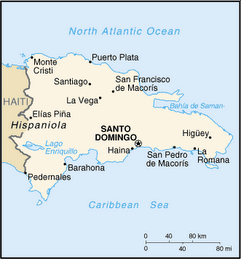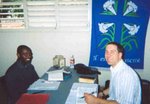
Well, our Christmas tree went to the dogs - literally. The watchdogs that guard the church during the night decided to "play" with the Christmas tree. They tipped the tree over and chewed on the branches and broke most of the ornaments. There was not much left of what had been a beautiful Christmas decoration. So our beautiful tree was recycled and now we have several decorative wreaths, hung high up on the walls!

Recycling is a very common thing in third world countries. Nothing is ever thrown out. Everything is fixed again and again until it cannot be fixed anymore and then it is taken apart and used as parts for repairing other items!
One very common item that is recycled is the oil drum. You see them everywhere. Most people use them for garbage cans. But some creative people have used them for dog houses. And we see them used as grills that hold quite a large quantity of meat for barbecuing.
We also se
 e many people that push carts around town looking for things that can be reused or sold. Rule number one is - never throw anything away! If you do, expect someone to pick it out of the trash and find some use for it. This man pushes his cart around our neighborhood. Usually he is looking through the trash for empty bottles which he can trade in for a peso a piece. This is his income to take care of his family.
e many people that push carts around town looking for things that can be reused or sold. Rule number one is - never throw anything away! If you do, expect someone to pick it out of the trash and find some use for it. This man pushes his cart around our neighborhood. Usually he is looking through the trash for empty bottles which he can trade in for a peso a piece. This is his income to take care of his family.It is really interesting to see how things that could be trash become useful items. Chewed up trees become beautiful wreaths, oil drums become grills, used bottles become a family's income. And here also, God has deigned to recycle souls - from sinner to saints. His Word is changing hearts by washi
 ng away sin and guilt and giving forgiveness and hope. People who feel "chewed up" by their sins and rejected and "thrown out" by others hear the good news of forgiveness in Jesus and that because of His perfect life and innocent death, God has a use for them - to serve Him and to speak of His love to others.
ng away sin and guilt and giving forgiveness and hope. People who feel "chewed up" by their sins and rejected and "thrown out" by others hear the good news of forgiveness in Jesus and that because of His perfect life and innocent death, God has a use for them - to serve Him and to speak of His love to others.So, even though we had to recycle our tree, our hope is still strong. This past Sunday over 80 recycled souls attended worship service to hear that their sins separate them from God, but that because of Jesus, in His great love and mercy He will still find a useful purpose for them in this life. Trees becomes wreaths, oil drums become grills, bottles become pesos, sinners become saints.




















































